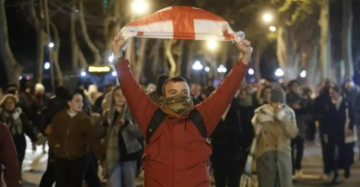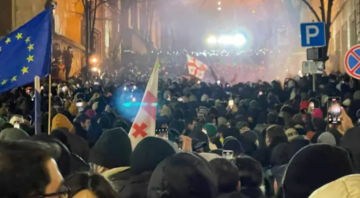The recent events, particularly the manipulations during the parliamentary elections and the brutal suppression of protests, raise concerns about the future of Georgia and cast doubt on its relations with the West.
This was stated by Christian Caryl, a Washington journalist for Foreign Affairs. He adds that despite the obvious violations during the elections, the West seems unprepared to take decisive action. European and American officials are not ready to burn bridges with Tbilisi and have limited themselves to noting that "international observers did not declare the results free and fair."
According to him, since coming to power 12 years ago, the "Georgian Dream" has conducted a masterclass in the art of state capture.
"The leader of the 'Georgian Dream', Bidzina Ivanishvili, has gradually replaced almost all key officials in the bureaucracy, judiciary, and law enforcement with party loyalists. In a country where a third of the population works for the state or directly depends on state handouts, this control over the state bureaucracy is a powerful tool for ensuring the desired electoral outcomes," writes Caryl.
He added that in 2017, the "Georgian Dream" used its resounding victory in the previous year's elections to lay the groundwork for a large-scale 'reform' of the constitution, which granted the party a significant advantage in future votes. It slowly established control over the central electoral commission and local electoral commissions.
"In the past, even when the 'Georgian Dream' was pressuring its opponents and deepening its control over the state apparatus, it continued to maintain the prospect of cooperation with the West. In turn, officials in Brussels and Washington largely ignored the party's anti-democratic trends," the author notes.
Christian Caryl mentioned the notorious foreign agents law. At the beginning of 2023, the ruling party presented the first version of the law aimed at imposing strict reporting requirements on private organizations receiving foreign funding.
"The draft text bore a striking resemblance to the Russian foreign agents law introduced by Putin in 2012, which turned out to be a very effective tool for persecuting the opposition; the 'Russian law', as it was soon dubbed by the Georgian opposition, was defeated by a wave of public protests," the expert observes.
However, as Caryl pointed out, just a few months later, the European Union offered Georgia candidate status, which was a significant boost in prestige for a government that had already demonstrated its anti-democratic instincts.
"The Europeans made sure that this proposal was based on the fulfillment of nine key conditions aimed at strengthening democratic institutions. Nevertheless, it is easy to understand why the 'Georgian Dream' may have concluded that its behavior costs it very little in Western capitals. Since then, the party has managed to push through a revised version of the law — an important step towards an Orbán-style state capture with the silent approval of the Kremlin," the analyst reflects.

In December, following the brutal suppression of protests, the U.S. imposed a visa ban on about 20 Georgian officials, accusing them of undermining democracy. The Baltic states also imposed sanctions, but Washington has not yet enacted broader restrictions.
While financial sanctions and travel bans may affect Ivanishvili and the 'Georgian Dream', the Biden administration is unlikely to act without European support. A 'Georgian Dream' official stated that the party is not worried about this, as Hungary and Slovakia have already torpedoed the latest attempts by the EU to announce broader sanctions.

"Washington is likely to refrain from further actions until the end of the Biden administration's term, and the EU cannot reach a consensus due to Hungary's potential veto on serious sanctions. Ivanishvili, for his part, understands that any concessions to the opposition could lead to his downfall, as happened with Ukrainian President Viktor Yanukovych in 2014," believes Christian Caryl.
Source: foreignaffairs.